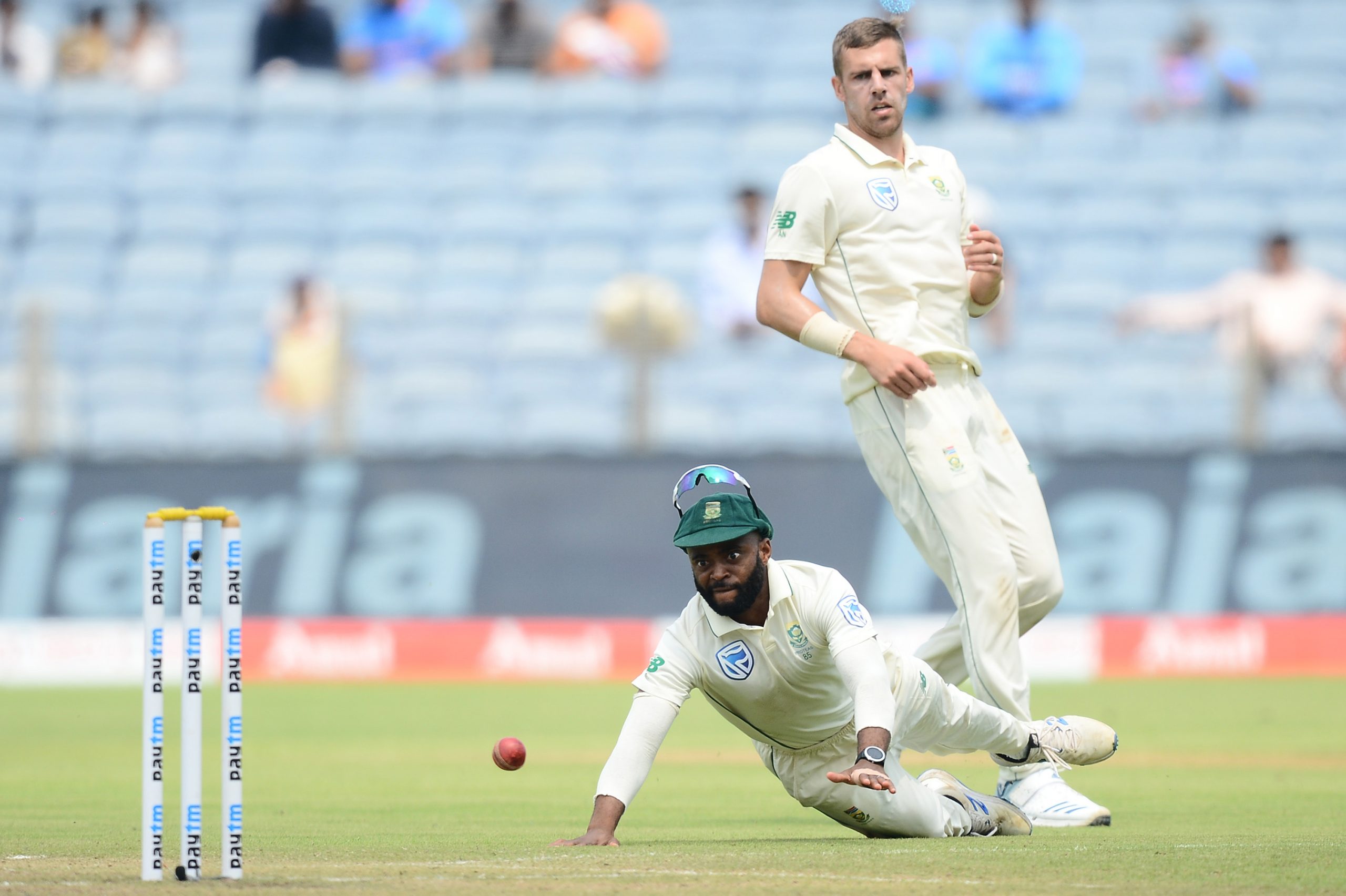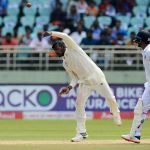Temba Bavuma, a cricketer with principles
The South African batsman, like many of his countrymen, has struggled in a tough Test series against the No. 1 ranked India. But he remains defiant as a vice-captain who wants to lead by example.
Author:
22 October 2019

Temba Bavuma is hurting. The Proteas have been annihilated by India in a morale-crushing three-Test series. Aside from a promising 38 in the second innings in Pune, South Africa’s only black African batsman has failed to score the kind of runs needed to add spine to the middle order and resistance against a relentlessly excellent Indian team.
He had looked defensively strong and fluent in attack while the cold numbers – 18, 0, 8, 38 and 32 in the first innings in Ranchi, followed by a duck – hid some unplayable balls and bad luck.
But it is in the numbers that batsmen are judged and Bavuma doesn’t shy from a dropping Test average. He “does not want to make excuses”, nor will he shirk responsibility for his part in the failures that have contributed to a nightmare tour.
During the press conference after day four in Pune, Bavuma surprised the gathered journalists with a candour rarely seen in the cliché-ridden echo chamber of international sport sound bites.
He was introspective, self-critical and sincere: “I’m giving my best, but probably my best at this point in time is not good enough. In saying that, it is not something that I’ll shy away from. Criticism is a good thing. I’ve always felt that it’s just a matter of me, as a professional cricketer, stepping up to the pressure that is before me and trying to win back the support of the fans back home.”
Two days later, at the Proteas’ hotel in Pune, amid the ubiquitous hooting of auto-rickshaws, motorbikes, cars and buses puncturing the morning air like shriller, angrier, shorter-pitched vuvuzela bursts, he remains defiant.
His eyes are steady and clear. His words thoughtful. Bavuma is a proud person and failure will not be countenanced for long.
Dealing with the pressure
He admits this has been a “tough tour”, personally and for the team, against a “formidable Indian team with a lot of skill, a lot of experience playing around the world, and it showed”.
But he says failures are there to be learnt from and “legends are made in situations like these. And if you do enough right things, you could be considered with the likes of the Graeme Smiths, guys who came in as young guys at international level and took the team to No. 1 [in the world Test rankings].”
On a personal level, he says pressure has been ever-present at international level “and for me, what I have learnt [from this series] is to try and look it straight in the face. Sometimes, as players and people in general, we try and kind of bullshit ourselves. I mean when things are dark, they are dark, and the only way to deal with it is to first admit that it is dark and then afterwards you can move forward from there onwards.
“That’s what I’ve seen myself doing and I have tried to front up as much as I can, with my own individual performances, but even from the team.”
Aside from a first innings clawback in the opening Test at Visakhapatnam, when South Africa had recovered from an overnight score of 39-3 to get within 71 runs of India’s first innings score of 502 declared, the batting has failed.
Quinton de Kock and Dean Elgar scored centuries then. But ever since, the tail – Keshav Maharaj and Vernon Philander in particular – has provided more batting bite than the batsmen.
In Pune, the Proteas were incinerated by an Indian victory of an innings and 137 runs masterminded by captain Virat Kohli, who scored a career best of 253. South African shoulders have drooped during consecutive punishing days in the sun in both Tests and the team has yet to bowl India out.
Related article:
It has been mercilessly unforgiving, as tours of India usually are. There is a battle to regain mental strength and heal bodies while frustration has crept in on and off the field. Maharaj returned to South Africa early after injuring his shoulder and Aiden Markram flew out a few days later with a fractured wrist after apparently punching a “solid object” following a pair (of ducks) in Pune.
During a medium-term period of rebuilding for South Africa and the short-term intensity of playing against one of the greatest Indian sides to be assembled, Bavuma has also had to deal with the added pressure of being appointed Test vice-captain.
In this cricketing cauldron, has Bavuma changed his approach to the game and the team?
“First and foremost, I try and be as authentic as I can. I don’t try and change myself because I have that title as a vice-captain, so for me it’s to naturally allow all those qualities that the guys see in me to come out.
“I obviously have to be a bit more open to the so-called younger guys – I don’t like using that phrase – the less experienced guys. Be available for them whenever they need time to chat, allow myself to be vulnerable to those guys. But the biggest thing is just to be genuine in everything that I do.”
Showing his leadership qualities
In the second innings, with South Africa five wickets down, Senuran Muthusamy, looking to drive, hit Rohit Sharma, who was fielding at silly point, on the ankle. Sharma was dancing the tarantella and the Indian fielders quickly gathered around.
Muthusamy seemed extremely concerned, edging ever closer to the throng. At the non-striker’s end, Bavuma motioned for the 25-year-old, who was playing only his second match for South Africa, to move away. To return to being single-minded.
“It was nothing scripted or planned,” says Bavuma. “Obviously, the courtesy is to show care and I felt that we did that. Then, for me, there was no need for Sen to get even closer to the player. So at that point I felt that he should move away.
“We still have a job at hand at the end of the day and as big a mountain as it was to climb at the time, for me that’s where my focus was. And also, I think it’s important that we don’t lose that aggressive side. Yes, the performances haven’t been on our side, we haven’t been good enough, really. But we still don’t want to be losing that aggressive edge. At the end of the game it’s a different story.”
Related article:
That the technically sound, nuggety Bavuma likes playing cricket hard is tangible.
The 29-year-old who grew up in Langa, Cape Town’s oldest black township, credits two paternal uncles, Mongezi and Tengo Sokhanyile, who played non-racial cricket under the aegis of the South African Cricket Board during apartheid, for instilling in him a sense of the game and how it should be played.
This included an aesthetic and ascetic appreciation of the forward defensive.
According to The Story of an African Game by André Odendaal, Tengo Sokhanyile was named after John Tengo Jabavu, the late 1800s political activist and editor of Isigidimi samaXhosa (The Xhosa Messenger), the first isiXhosa newspaper in South Africa. He and Mongezi played for Langa Cricket Club.
They took a young Temba to club matches “as a child, a baby”, no older than two or three years old. “I think that’s where the seed was planted and that’s where things started. They’ve always advocated for technique, you’ve got to have the good technique in everything that you do and I think that’s why my game has been grounded in technique. I attribute my love for the game to them,” says Bavuma.
“I would like to think they introduced me to the sport and it kind of just grew in me. Until today I speak to them about batting, they’ll give me their thoughts, they’ll ask me why did I play a certain shot? Why did you do this?” he says.
Doing it for his family, too
Bavuma cracks a small smile when he says there are certain things about modern cricket that his uncles struggle to grasp, like the Twenty20 format of the game. They just don’t get the boom-bang nature of it.
But they live for, and through, the Test matches that he plays. “I feel like the journey that I am on in my cricket, it’s a journey that they want to be a part of. It’s something that they would have wanted to experience as well. Politically, they just weren’t able to express themselves in that way,” he says about apartheid’s race ceiling, which destroyed whatever cricketing aspirations the duo might have had.
Langa, with its history of black cricket, has produced players that include Thami Tsolekile, who played three Test matches for South Africa, Malusi Siboto, Siya Simetu and Nono Pongolo. It’s here that Bavuma says he learnt about “brotherhood” and a sense of community, where your friend’s mothers were yours, too, and neighbours never suffered from wanting because people looked out for each other.
From those grimy streets he moved to South African College Junior School, a venerable cricketing establishment in Cape Town’s upmarket and formerly whites-only suburb of Newlands. Then, when the family moved to Johannesburg, Bavuma attended St David’s Marist Inanda High School in Sandton, another established cricketing school that his family’s upward mobility in the middle class allowed.
Related article:
He recognises the privileges he enjoyed – specialised coaching, resources and equipment, and the chance to immerse himself in cricket without financial worry – that were denied to his “more talented” contemporaries.
“If I can look at my development as a cricketer, as a sportsman. I was born and grew up in a township in Cape Town where sport was a thing of the community. But in that, there were a lot of us who were talented in sport and I think where I was fortunate that I was taken out of that environment, that system, and I was put in another type of system … So opportunities weren’t something that was so far from me as a black kid and I was really able to enjoy my passion. My passion was nurtured by everything around me.”
Bavuma says it is this “nurturing” environment plus “the hard work, the perseverance, the dedication” that has allowed him to become a Test batsman.
From a township to Sandton, with some of the most expensive real estate in Africa, Bavuma says there are constant principles he has learnt and held on to in these different environments, namely “respect and how to be a man among other men”.
Two principles he feels are vital if South African males are to make any impact on the vertiginous levels of gender-based violence perpetrated in the country.
“When you speak about gender-based violence, it’s a sore topic, it’s committed by us men,” he says. “It’s very easy for me to say, ‘Well, I don’t do those sorts of things so I don’t need to get involved.’ We have a role to do what we can to try and influence that situation positively and try and ensure that our offspring, our kids, don’t grow up with that kind of mentality where they are above women, where they feel that they can do as they please,” he says.
“I spoke about respect and we need to see everyone as equals, not just along race lines but across gender lines as well … For me, it’s just to make sure that my offspring don’t have that mentality that they are above someone else. They need to keep their principles.”



